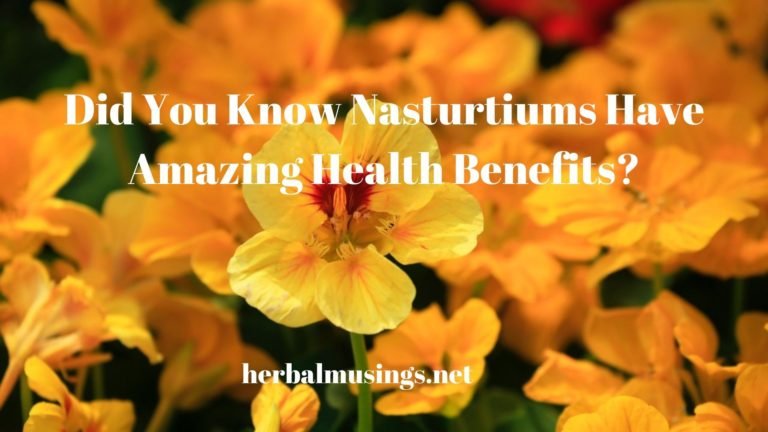Nasturtiums (Tropaeolum majus) come in a wide range of colors, including bright yellow, orange and red. The leaves are lush and round with big, drooping flowers that make them stand out in gardens.
Because this flower has antibacterial, antifungal, and anti-viral components, you can use it to fight off many illnesses and infections.
You can use nasturtium to treat or prevent various health problems both internally and externally such as infections, sore throats, bronchitis and minor cuts to name a few. By eating the fresh flowers or brewing a tea with a combination of leaves and flowers, you have an excellent source of immunity-boosting vitamin C and a natural remedy for helping your body overcome and prevent the common cold and influenza.
The leaves and flowers of nasturtiums are rich in antioxidants, vitamins including vitamin C, potassium, phosphorus, magnesium, calcium, manganese, copper, zinc and iron. These essential nutrients help support our immune, respiratory and digestive systems.
Another important antioxidant this plant is rich in is called lutein, and it’s associated with protecting against free radical damage and supports our eye and skin health.
Medicinal Uses of Nasturtium
This is a well known and effective plant in treating issues related to your upper respiratory system. It is one of the best known remedies for treatment against cough, chest congestion and bronchitis.
Cold And Flu
Nasturtiums excel with their expectorant properties that clears out excessive mucus from the respiratory tract. The edible flowers are also extremely effective in addressing various respiratory conditions such as asthma, bronchitis, inflammatory diseases, and cough as well as cold, flu, and emphysema.
Studies have shown that the leaves specifically possess natural antibiotic properties that help people coping with illnesses and infections, such as sore throats, respiratory infections, congestion, coughs, bronchitis and colds.
Nasturtium acts as both a disinfectant and as a healing agent. All parts of the plant have strong antibiotic and antimicrobial properties. This makes nasturtiums an excellent choice for cleansing and protecting minor scrapes and cuts and for healing external and internal bacterial infections.
Urinary Tract Infections
A study was conducted using a medicinal product containing nasturtium and horseradish to treat recurrent UTIs. It proved to be an effective and safe way to treat chronic urinary tract infections because of its anti-bacterial and anti-viral properties.
Digestion Health
These beautiful flowers work wonders to improve your digestive system. Nasturtiums are shown to boost liver function and performance as well as improve the liver’s bile secretion.
The dried ripe buds have a strong laxative effect, and unlike many conventional germicides, nasturtium will not damage the intestinal flora.
Heals Fungus
Nasturtium leaves and seeds are perfect for healing wounds and fighting infections because of their antiseptic and antifungal properties. One way to use this plant is to grind the seeds into a paste and put this paste on fungal infections like on your toes or toenails.
Culinary Uses of Nasturtium
The incredible thing about nasturtium is that the whole plant is edible! Flowers, seed pods, and young leaves can be eaten in salads, made into condiments or pesto and added to sandwiches. They have a crisp, peppery taste, similar to garden cress. Furthermore, the flowers look great as garnishes.
The chopped fresh leaves can be added to cream cheeses and various egg dishes to give a pepper-like taste. Or you can stuff the leaves.
Nasturtium seeds (which grow in pods) are combined with vinegar and spices to make a tangy condiment and garnish, which has a similar taste as capers and can be used in the same ways.
Note: Pregnant women should avoid nasturtium because it’s a very powerful emmenagogue. It induces menstruation, and it could cause miscarriage if taken in early pregnancy. All parts of the plant (flowers, leaves, capers) are off-limits during pregnancy. Similarly, people with kidney disease should speak to their healthcare providers before eating any part of the plant.
This flower has antibacterial, antifungal, and anti-viral components, you can use it to fight off many illnesses. It contains strong antibacterial properties that help keep disease-causing bacteria at bay. Nasturtium is an excellent source of anthocyanins that contain antioxidant, anti-inflammatory, and antimicrobial properties. The high antioxidant levels found in nasturtium help counter the negative effects of free radicals. Additionally, the phenolic compounds in nasturtium prevent the onset of chronic disorders such as cancer and heart disease.
